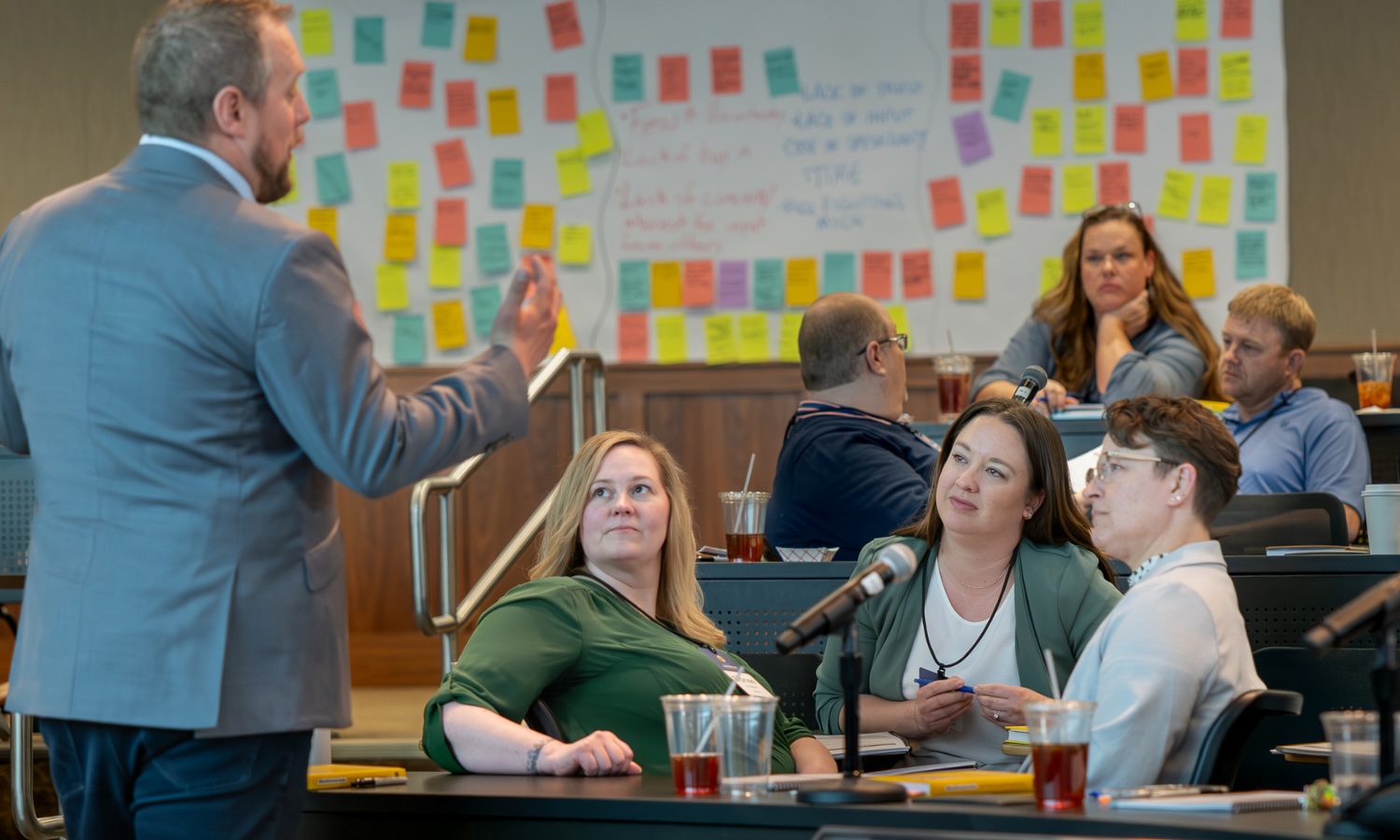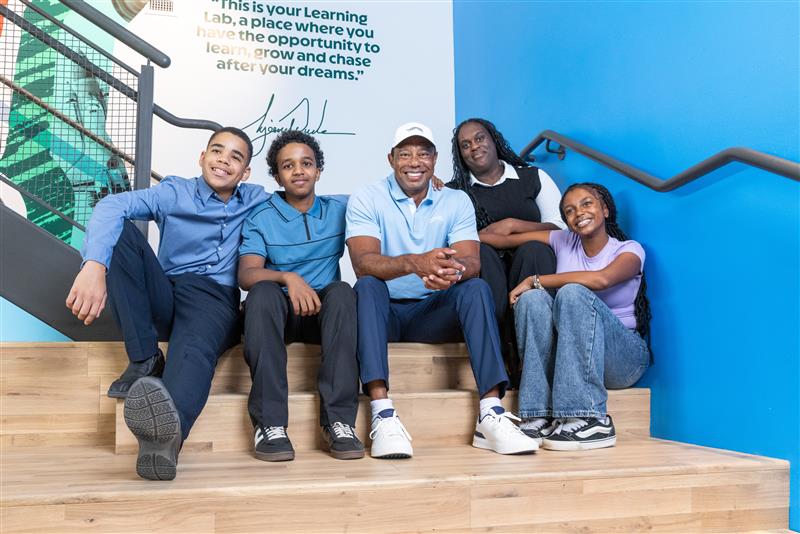While there are many quotable lines from the 1939 movie “The Wizard of Oz,” one spoken by Glinda the Good Witch to Dorothy may best articulate the principles that animate the Kansas Leadership Center (KLC).
“You’ve always had the power, my dear,” Glinda says. “You just had to learn it yourself.”
Set in Kansas — just like the first moments of “The Wizard of Oz” — KLC seeks to unlock each person’s power to lead, solve challenges, and enhance their own lives and the lives of others. It accomplishes this mission by providing leadership development and civic engagement training for individuals and organizations committed to bottom-up change.
While KLC traditionally has worked with nonprofit executives and employees, in early 2025 it launched a program, Workforce Innovators, for Wichita-area business leaders interested in establishing more human-centered leadership, hiring, and talent development practices. According to KLC President and CEO Kay Monk-Morgan and Senior Fellow for Curriculum Development Julia Fabris McBride, the program is a win-win for employers and employees, along with the communities they serve.
“This program moves beyond the notion of the degree or the pedigree, but it also will help companies to examine the continual needs of a workforce in order to be able to drive innovation and change,” said Monk-Morgan. “It will help people consider ‘what is human potential,’ both in the work context, and at the community level.”
Inspiring Business Leaders Open To Human-Centered Change
Like employers across the country, Wichita-based companies are struggling to address lagging employee engagement, talent gaps, and retention challenges. Workforce Innovators helps individuals from these companies transform their thinking so that they can empower themselves and others to innovate, contribute to the long-term success of a company, and advance their personal skills and careers.
The first cohort of Workforce Innovators began in April with a cross-industry group of 11 companies ranging in size from 100 employees to 1,000. The firms include Emprise Bank, Five Star Mechanical, and Bombardier. The individual participants all held different titles and came from different divisions or departments. Their common goal? “An aspiration for a more empowered, more fulfilled workforce,” said Fabris McBride.
Through Workforce Innovators, the participants gained access to:
- Leadership coaches who help brainstorm and develop specific talent and leadership development changes;
- Information about the principles that inform a more human-centered approach to hiring, training, and retention; and
- A forum to exchange ideas with committed leaders facing similar challenges.
With support from the Charles Koch Foundation, the program is free to participants. The total value of leadership development and capacity building is $3,200 per person.
Unlocking A Cycle Of Mutual Benefit
A key part of Workforce Innovators challenges traditional workplace dynamics by reimagining both the employer-employee partnership and how individuals find meaning in their work.
“The terms human resource or human capital have a connotation — that we leverage people for gain,” said Monk-Morgan. “Instead, we seek to build a partnership mentality. Employees should see themselves going to a workplace where they can make a mark, exercise leadership, and have a voice. It’s a mindset shift from, ‘you come here to do what I need you to do’ to one where ‘you come here and we do something really great together.’”
Employers benefit enormously from giving employees a greater voice and stake in business processes, said Fabris McBride. First, the shift results in a mission-aligned workforce. “Any company’s mission, whether it’s building great roads, caring for the elderly, or creating new technology, that’s a big challenge,” said Fabris McBride. “We want to help employers develop people who put that challenge at the center of what they do every day.”
The mindset shift also results in improved employee engagement. “From an executive’s stance, if the people in your company understand what your work is really about, they don’t just show up to do their part,” said Monk-Morgan. “They show up to move the company forward. They care about the impact their company is making, whether it is making a profit, making the world a better place, or both.”
But that is not the only benefit. Human-centered talent practices also reap benefits for communities that, in turn, will fuel future workforce stability. “When the company is satisfied, and the employee is satisfied, there’s more room for civic engagement,” said Monk-Morgan. “If you’re not focused on fixing things internally, companies can really show up in community to help with the large issues like literacy, homelessness, and food insecurity.”
This engagement creates a virtuous cycle for employers, Fabris McBride added. “A thriving city depends on employees wanting to stay there and raise their families and send their kids to colleges in the state,” she said. “So, workforce development itself is a community issue.”
Bottom-Up: Change Can Come From Anywhere
The underlying principle of Workforce Innovators, and all KLC’s work, is that leadership is not about authority or rank. Every human being can lead, no matter where they sit in an organization or in a community, and good ideas, culture improvements, and change can start anywhere. Leadership is small actions taken by a single person in moments of opportunity.
What this framework suggests is that, like Dorothy, people just need to learn their own power to find their way home — or their purpose.
After unlocking their own power and voice to effect change in their companies, Workforce Innovators participants are excited to stay connected to KLC and its programs. “We had some companies nominate three or four or five people and now they’re really interested,” said Fabris McBride. “They want to learn more, and they want to see what’s next.”
Workforce Innovators’ capstone, the Empowering Practices Toolkit, will offer the opportunity for these leaders to continue to evolve their leadership and talent development practices. Once launched, this dynamic online resource — which will feature learnings from Workforce Innovators participants and talent development experts like Per Scholas and the SHRM Foundation, along with tools for applying the KLC leadership framework and Principles Based Management — will help guide ongoing personal growth, institutional change, and problem solving.
“Our eventual goal with the toolkit is to build an online community of practice,” said Fabris McBride. “We want to build a network of people who are interested in helping themselves and others expand their capability to contribute at work, and in the community.”
Monk-Morgan believes the toolkit will give businesses the knowledge and power to continue to lead no matter what new challenges or disruptions come into the marketplace. “My grandpop, who lived to be 102, lived through so many changes. Every generation has them,” said Monk-Morgan. “We’re building a leadership toolkit that will help companies prepare for what we all know is coming — the unknown. Our participants will know how to figure things out, experiment, discuss, and then adapt.”









